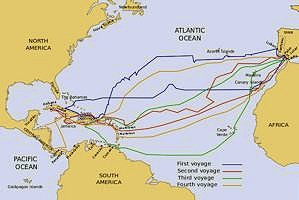
|
Some Common Myths Thought to be True - Myth 7
Myth 7: Christopher Columbus Discovered America
In the early modern period, the voyages of Columbus initiated European
exploration and colonization of the American continents, and are thus of great
significance in world history. Christopher Columbus was a navigator and an
admiral for Spain. He made four voyages to the Americas, the first being in
1492, which resulted in the Discovery of America from a European point of
view.
|
| The Four Voyages of Christopher Columbus | |
|
While
Columbus was not the first European to voyage to the New World and did not
actually reach the mainland until his third voyage in 1498 (when he reached
On the fourth voyage, he reached Central America), his
discoveries led to the widespread knowledge of the existence of the new
continent, and to major European sea powers sending expeditions to the New
World to build trade networks and colonies and to convert the native people to
Christianity.
|
|
| ⇦ Back to Myth 6 Return to Myth Choices Page 1 On to Myth 8 ⇨ | |